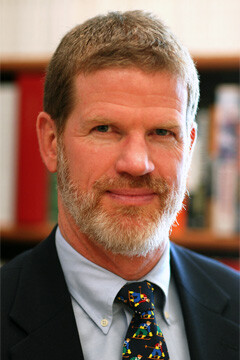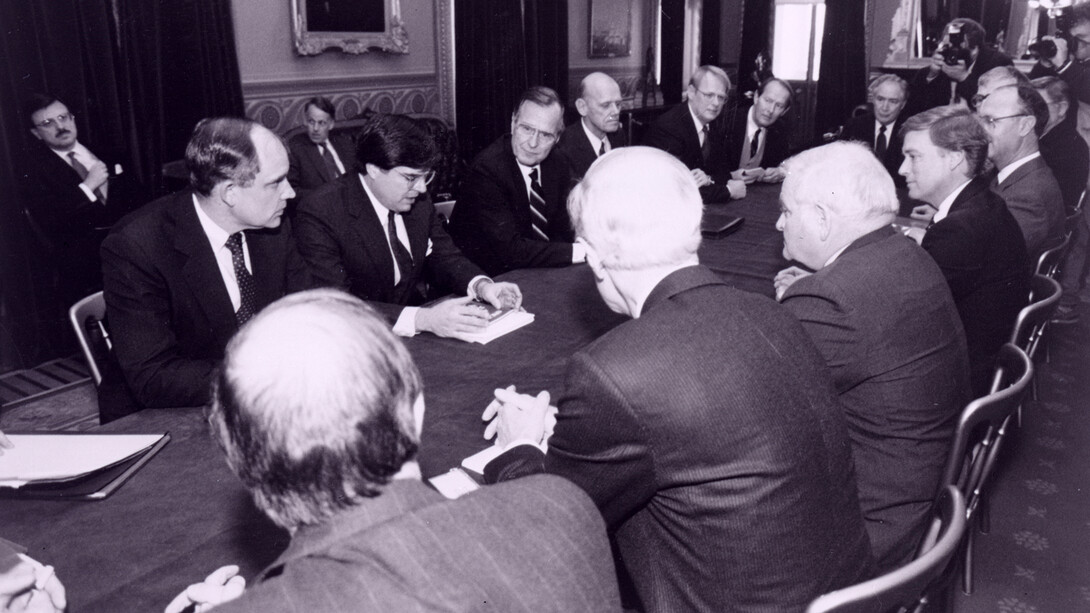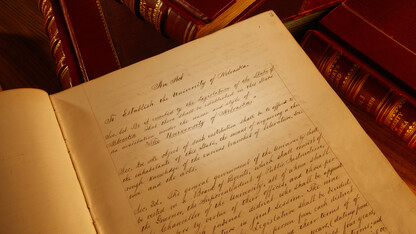
EDITOR’S NOTE — As the nation pauses to honor the legacy of President George H.W. Bush, Nebraska Today is looking back at the 41st president’s impact on the University of Nebraska–Lincoln. In this story, we examine Bush’s broader impact at home and abroad and how it reverberates today. See complete coverage of Nebraska Today’s Remembering 41 series.
Enlisting in the Navy on his 18th birthday, George H.W. Bush embarked on a lifelong career in public service, and much of that service was on foreign soil.

This made him well-equipped to handle the immense foreign policy challenges — from the fall of the Soviet Union to the humanitarian crisis in Somalia — he faced as President of the United States, scholars at the University of Nebraska-Lincoln said as they reflected on his life.
Patrice McMahon, professor of political science and director of the Honors Program, said Bush is one of the most interesting foreign policy presidents in history.
“He really devoted his life to foreign affairs,” McMahon said. “Because of his service in the Navy, he knew the implications of using military might on the ground. He didn’t want to overstep or be the world’s police.
“He had a pragmatic, nuanced approach to foreign policy and he was acutely aware of how important foreign relations were to the United States.”

McMahon was a Fulbright Scholar in Poland when the Soviet Union fell, and she remembers her Polish counterparts having much respect and admiration for Bush as he maneuvered for a peaceful transitions of power.
“I was very proud of having a president who was trying to bring those countries to the discussions,” McMahon said. “He was trying to inspire people to move in the right direction after the Cold War ended.”
Presidential historian Tim Borstelmann said his pragmatism also drew ire at the time.

“Some criticized him for being relatively conservative in his initial support of dismantling the Soviet Union but he was nervous about what was going to take its place,” Borstelmann, E.N. and Katherine Thompson Professor of Modern World History, said. “It’s an amazing moment in history, but we didn’t know then what was going to happen. Would it be peaceful? It was, and I think he and Mikhail Gorbachev get credit for that.”
Tyler White, assistant professor of political science and director of the National Security Program at Nebraska, said Bush’s ability to build relationships with foreign powers was important in addressing many of the problems that existed during his administration, and beyond.

“His biggest contribution was his ability to create good, lasting coalitions of allies to get things done,” White said.
Borstelmann pointed to not only his handling of the end of the Cold War, but also the 1991 Gulf War as evidence of this.
“He was able to put together the international coalition to drive the Iraqis out of Kuwait,” Borstelmann said. “Most people think of that as an American operation, and it was American-led, but Bush was able to recruit dozens of allies who supported us to prevent further aggression by Iraq. He did his diplomatic homework before entering Kuwait.”
White praised Bush for how quickly he and his administration concluded the offensive against Iraq, and acknowledged the reservations much of the public had about entering into the conflict.
“He was firm and he put together a winning strategy and he had good people behind him,” he said. “They did it and they came home.”
White said Bush faced much criticism for not toppling the regime of Saddam Hussein, but the president and his advisers — including Secretary of Defense Dick Cheney — feared not having Hussein in power would lead to worse violence or civil war. In hindsight, they made the right decision.
“I think his decision to not depose Saddam Hussein was vindicated, unfortunately, by his son’s decision to do so,” White said. “Iraq did exactly what we had feared in 1992, which was it fell apart into a sectarian civil war that created insurgencies and a haven for international terrorists, and more people have died as a result.”

The civil war in Somalia was another difficulty at the end of President Bush’s tenure, and it brought mixed results. Near the end of 1992, after Bush had lost re-election to Bill Clinton, he sent 25,000 troops to the country to set up a safe zone for humanitarian aid.
On one hand, McMahon said the actions of Bush saved 50,000 people.
“It was the purest form of humanitarian aid,” she said. “There was no political gain to be made or agenda behind it, other than to bring relief to the famine and suffering there.”
The decision coincided with his well-documented compassion, but there was fallout.
“The Somalia mission was well-intentioned, but there wasn’t a strategy there,” White said.
Borstelmann added that eventually the situation deteriorated and troops were killed, which soured the United States on intervening in future conflicts.
“It made Americans shy about using troops to give protection while putting them in harms’ way,” Borstelmann said. “I think that informed the lack of U.S. response to Rwanda, for example.”
Bush has been lauded much for his foreign policy, but closer to home, he was less successful.
“It’s a mixed record, but given the foreign policy and legislative failings of the Republican presidents since then — his son included — he was largely successful,” Borstelmann said. The Bush administration was part of the successful drafting and passing of the Americans with Disabilities Act and amendments to the Clean Air Act, among other legislative accomplishments, but the country’s economy remained in a recession during his tenure.
And that likely cost him re-election, White said.
“I still remember thinking, ‘Wow, how can a guy with such high popularity lose an election?’ And as Bill Clinton would say, ‘It’s the economy, stupid,’” White said. “He understood the rest of the world, but didn’t always understand his own country, in terms of the kitchen table issues.”
Failings included, McMahon said, the United States and the world are better because of Bush’s legacy.
“Looking at the whole of his career as a public servant — regardless of your party — you have to respect and admire his life and dedication to public service.”







